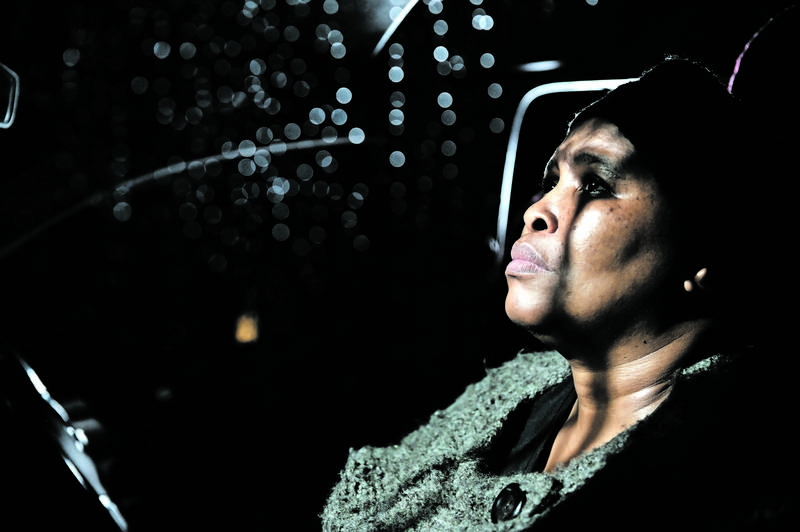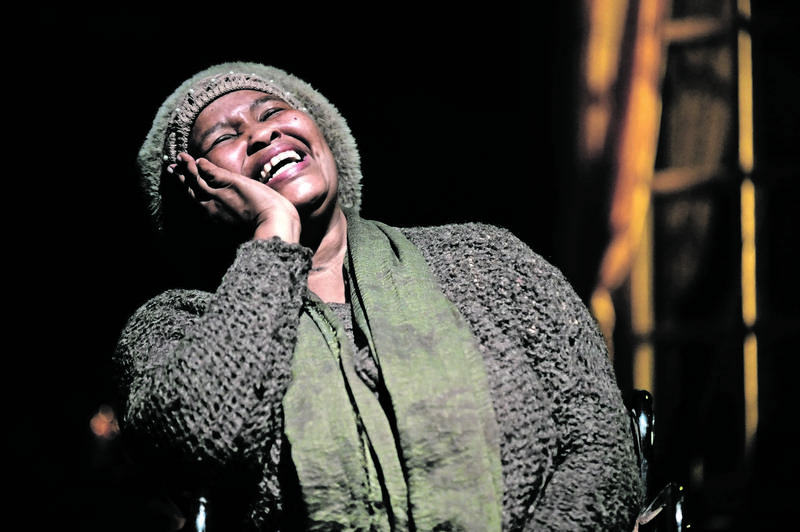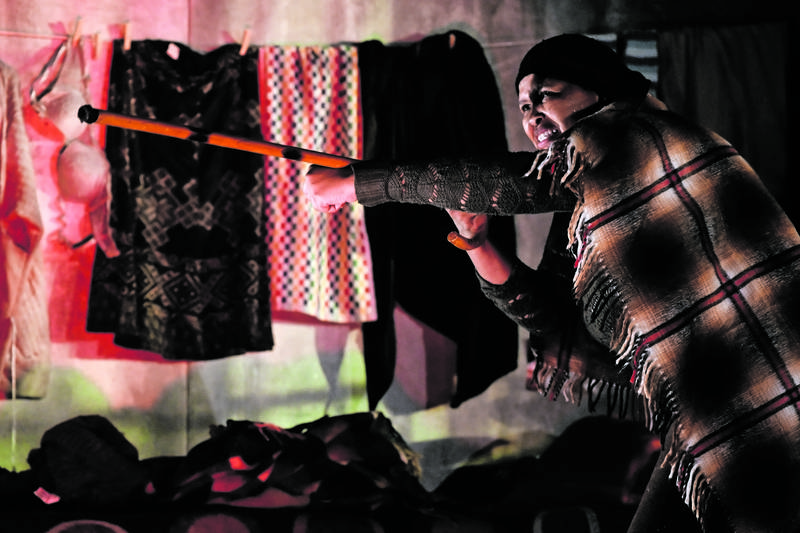Digging deep: Mpume Mthombeni on stage in the documentary-style
one-woman show ‘Isidlamlilo/The Fire Eater’.
Photos: Val Adamson
The one-woman show Isidlamlilo/The Fire Eater is set to hit the stage at Johannesburg’s Market Theatre, telling the true story of a former female assassin for the Inkatha Freedom Party (IFP).
But this assassin, — played by award-winning actor Mpume Mthombeni — is a more complex character than a political assassin. Through her fiery performance, Mthombeni reveals the complicated psychology of Zenzile Maseko, who today is a partially disabled gogo, and who was once declared dead by the home affairs department’s inefficient system.
Isidlamlilo/The Fire Eater is under the direction of former Standard Bank Young Artist for Drama winner Neil Coppen. The team at the theatrical company Empatheatre brings to the stage fascinating oral histories, Zulu folklore and recounts of political violence, converging in a production that is funny, sincere and frank.
“I promise you there will be a standing ovation every night!” says Mthombeni.
“Everything you see on stage comes from actual people and we’re making sure we’re telling their stories with dignity, respect and empathy. We go deeper.”
The play amplifies the voices of gogos who live within the chaos of KwaZulu-Natal.
“This is a play for the grandmothers of this nation. Some are putting grandchildren through school or feeding 10 grandchildren with their work. These women across both rural and urban areas, gogos are the ones who keep things together,” Coppen says.

The original Isidlamlilo
Isidlamlilo/The Fire Eater is not just one woman’s story but the stories of five women compounded to reflect narratives of women in South Africa’s tricky history.
But, through the world of documentary theatre, their original voices are protected and nurtured by virtue of an actor.
Maseko’s character stems from a previous Empatheatre project on migrant women narratives commissioned by the Urban Futures Centre. These stories came from not only refugees but local Zulu women from rural areas recounting what it means to come to the city of Durban, Coppen recalls.
But what emerged from this project was a story uncovered from a Durban women’s hostel that was so “operatically lived” and so complex — that of a woman who was an assassin for the IFP.
Yet, through reading interview transcripts, you could see this woman was full of compassion — an interesting gogo, Coppen says.
“We also threaded in other stories, like people arriving at home affairs and learning they had been declared dead, and that taking up to 11 years to reverse that on the system,” explains Coppen.
“But in the meantime, these gogos aren’t able to access grants or vote. You have no ID, so you might as well be dead.”
Mthombeni recalls going to meet the woman who inspired the character Maseko. Today, she is a gogo who manoeuvres a wheelchair in a small room of a Durban Women’s hostel, yet she is fiercely independent.
“It was the first thing I needed to do — to learn how she talks, how she moves,” says Mthombeni. “I was scared. She would just talk without a filter; she was never scared of anyone, she was a fighter.”
Maseko showed Mthombeni old photos of her as a traditional Zulu dancer, standing out on stage. While she was talking, Mthombeni could see the other side of her, “the fire eater” as she does not take nonsense from anyone.
But, at the same time, there was so much warmth and love, Mthombeni recalls.
“I could feel it. She talks about her children and bathing people who are HIV-positive after their families had deserted them. You could feel the love and care.”
“It goes against this binary perception of African women stereotypes like a stoic, maternal gogo or aggressive, angry black women,” says Coppen. “There is also a conflict between Christianity and traditional beliefs, ancestors and worship, it’s a complex marriage.”
There’s another side of Maseko’s efforts of going to church and trying to repent and asking for forgiveness but being pushed away.
“This says a lot about churches, which judge people and say, ‘God loves us all.’ But when someone asks for help, they are judged and the church closes them out,” says Mthombeni.
Despite Maseko’s fierce independence, Mthombeni couldn’t look past her frail state, offering to help her open a bottle she was struggling with, having been left weak after experiencing a stroke.
“She was pouring me a drink, trying to open it with one hand, and holding it with another hand. I offered to help her and she said, ‘No because you are leaving. When you leave how do I continue?’” Mthombeni says.
With KwaZulu-Natal’s high rates of politically charged assassinations, it is interesting to learn
about the heart of a woman who was responsible for this for a long time. You hear of more male
than female assassins, but what is the psychology of a political assassin?

Theatrical two-way street
A documentary-style one-woman show, Isidlamlilo/The Fire Eater does not shy away from humour, while addressing oppressive behaviours and complex issues.
Empatheatre’s productions are built on deep research and this informs the play’s complex subject matter, as well as strategic audience building, which allows the production to speak directly to policymakers, officials and those whose voices are not heard who sit in the audience together.
“It’s a bottom-up approach of listening to marginalised voices and people on the ground, who aren’t being considered in situations, and trying to use theatre to amplify those voices so they can be heard and located firmly centre stage,” Coppen says.
He describes this as “building an audience with ears”, where theatre is used to allow people with oppressive behaviour to be in the audience with policymakers, and government officials, and reach people with the power to change situations.
“When there is something problematic to people, that’s when we begin digging and looking to understand,” says Mthombeni.
“When we are performing, all the stakeholders are involved. Everyone who brings us their stories sits with us and tells us where we went wrong and we get feedback.”
As a research-based theatre company, Empatheatre is collaborative by nature, bringing its own research together with knowledge from activists, academics, artists, human rights lawyers and the subjects of the work as well.
The power of having research performed live on stage gets more people than just universities and policymakers involved.
“But that’s where research grants and companies have become excited about us as a research dissemination tool,” Coppen says.
“It’s amazing to see the reactions from these policymakers when the work is performed live,” Mthombeni says. “You can see how touched they are and they start to rethink how they make their policies.”
Last month, Mthombeni returned to South Africa after performing in New York City for top United Nations policymakers for ocean governance. On World Oceans Day, she performed on the UN stage for 1 200 people while talking about the power of storytelling.
 Fiery: Mpume Mthombeni in the play ‘Isidlamlilo/The Fire Eater’, which is about a woman who was an assassin for the IFP. Photo: Val Adamson
Fiery: Mpume Mthombeni in the play ‘Isidlamlilo/The Fire Eater’, which is about a woman who was an assassin for the IFP. Photo: Val Adamson
Actor’s archive
As a director, you don’t direct Mthombeni, you let her show you and she finds what she needs to do, Coppen says.
In Isidlamlilo/The Fire Eater all the different characters become one person but Mthombeni plays a cast of thousands.
As an actor, Mthombeni says she has no limitations. “I’ll go sit in a tavern, a sidewalk workshop” or even use the experience of nursing her mother through a stroke, to watch how people behave, walk and talk.
“I’m making an archive of people who I can use for any character when they come,” she says.
At the same time, she says that the powerful performances on stage are fuelled by her ancestors, noting that, after a performance, she comes out of a trance like a sangoma would.
“I work with my ancestors; I call upon them every time,” Mthombeni says. “They are the ones who are driving me because I’m not myself when I’m on stage. It’s all my ancestors, I’m the body they’re using. It’s a beautiful gift and it’s an honour to share my gift with the world,” she explains.
Mthombeni has to come down after a performance. She cannot separate herself from the subject after the show although she can physically leave the character on the stage after removing her costume. But, emotionally, she is still there with them.
Isidlamlilo/The Fire Eater runs at Johannesburg’s Market Theatre from 21 July to 6 August before embarking on a month-long European tour.